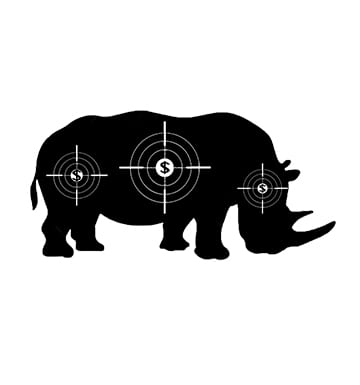
In the past few weeks, the Dallas Safari Club caused uproar among environmental and conservation groups. The club announced plans for a new fundraiser for endangered rhinoceroses in Namibia. The huge public reaction is no surprise, given that the club intends to raise money by auctioning off a permit to hunt and kill one of the endangered black rhinos it is raising money to protect.
The club’s arguments for its fundraiser indicate that they believe the monetary benefits of the permit auction are worth the negative public backlash. The club expects the permit to sell for at least $250,000, possibly up to $1 million. They pledge that 100 percent of the proceeds from the auction will go to The Conservation Trust Fund for Namibia’s Black Rhino. The funds would assist in paying for health checkups for the rhinos and would help protect the animals from poachers.
This fundraiser is entirely hypocritical. Though it has the potential to raise a significant amount of money, the participation of the members comes not from a genuine dedication to conservation but rather from a place of noncommittal philanthropy.
In other words, the members of the Dallas Safari Club couldn’t care less about the well-being and preservation of the endangered black rhinos of Namibia. Their charity allows them to justify their harmful hobbies and consider themselves charitable through passive participation.
An important question to ask of the Dallas Safari Club is what will be done with the body of the rhino after it has been hunted. Rhino horns are highly valuable on the black market and are considered powerful enough by some cultures to cure anything from a hangover to cancer. A single rhino horn can sell for anywhere from $100,000 to $300,000, depending on its size.
Where will the money from this valuable body part go? The horn could sell for a price comparable to that paid for the permit. By selling the horn, the victorious hunter could win back much of what he or she paid for the permit while still enjoying the experience and satisfaction of hunting down a black rhino in Namibia.
An organization that claims to fight for a certain cause should not violate that cause in the process. The Dallas Safari Club should not raise money to protect endangered rhinos by offering the opportunity to kill one.
Yes, it is a hunting club. Yes, the auction could raise a significant amount of money. But a hunting club raising money for animal conservation is already a contradiction, and the fact remains that their method is completely hypocritical and ridiculous.
The club serves its own interests by investing in wildlife conservation. After all, what would a hunter do if there was nothing to hunt? The club protects its own interests by investing in the preservation of wild game.
The club’s website states that it is “more than a club.” Rather, it is “a way of life!” Indeed, the Dallas Safari Club is concerned only with the protection of a lavish lifestyle. The protection of endangered rhinoceroses in Africa is most likely the last thing on the minds of club members vying for the permit to hunt, kill and display such an impressive trophy.
Anna Krainc ’16 krainc@stolaf.edu is from Downers Grove, Ill. She majors in English and Spanish with a women’s and gender studies concentration.
Graphic Credit: DANIEL BYNUM/MANITOU MESSENGER

